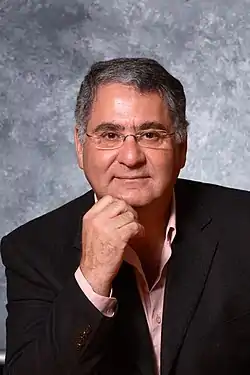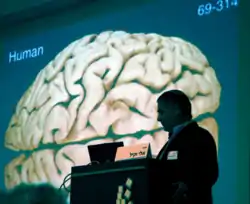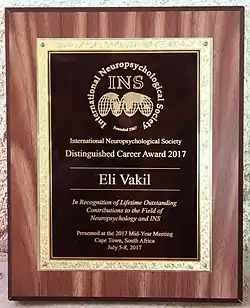Eli Vakil
Eli Vakil (born March 4, 1953) is a clinical neuropsychologist. Vakil is a full professor and former departmental chairman in the Department of Psychology,[1] and the head of the Memory and Amnesia Lab (in memory of Jacob Ballas) at the Gonda (Goldschmied) Multidisciplinary Brain Research Center at Bar Ilan University.[2] He is also director of the Rehabilitation Center for Veterans after Traumatic Brain-Injury (TBI) in Jaffa, Israel[3].
Eli Vakil | |
|---|---|
אלי וקיל | |
 Eli Vakil | |
| Born | March 4, 1953 |
| Citizenship | Israeli |
| Alma mater | Bar Ilan University, City University of New York |
| Organization | Bar Ilan University |
| Spouse(s) | Tamar |
| Children | 3 |
| Awards | Distinguished Career Award of the International Neuropsychological Society |
| Website | faculty |



Biography
In 1974–1976, Vakil studied at Bar-Ilan University, Ramat-Gan, graduating with a B.A. in psychology.[2]He received his Ph.D. in clinical neuropsychology from the City University of New York (CUNY) in 1985. His dissertation was titled: "Encoding of frequency of occurrence, temporal order, and spatial location information by closed-head-injured and elderly subjects: Is it automatic?". Vakil is married with three children and lives in Ra'anana[4]
Academic and therapy career
In 1995–1996, Vakil was a visiting scholar at the Amnesia Research Laboratory (Professor Neal J. Cohen), Beckman Institute for Advanced Science and Technology, University of Illinois at Urbana-Champaign (UIUC).[5]
Vakil started his career as a clinical neuropsychologist working in rehabilitation with patients who had sustained severe head-injuries. He worked at the Head Trauma Program at the Rusk Institute of Rehabilitation Medicine in New York University Medical Center, and in the Recanati National Institute for the Rehabilitation of the Head-Injured Person in Israel.[6][2]
Certified by the Ministry of Health as a rehabilitative psychology specialist and supervisor.[7]
Vakil served as a member of the discussion group “Holocaust – Transmitted Memory and Fiction”, a project conducted for a research group and workshop at Van Leer Institute for Advanced Studies, Jerusalem (2013-2015).[8]
In the summer of 2017 he was a visiting scholar at the Kessler Foundation in West Orange, New Jersey.[9]
Vakil was chairman of the rehabilitation psychology section in the Israeli Psychological Association[10] and as the head of the rehabilitation psychology subprogram at Bar-Ilan University.[11]
He is a founding member of the Israeli Neuropsychological Society and has served as a board member of the International Neuropsychological Society (INS).[12]
Vakil has served as an associate editor of the Journal of the International Neuropsychological Society (JINS).[13]
In 2017 he received the Distinguished Career Award of the International Neuropsychological Society (INS).[14]
Vakil has published extensively (over 150 scientific papers and book chapters) in the area of memory and memory disorders in various populations, such as traumatic brain injury patients, Parkinson’s disease patients, and the elderly.
Awards and recognition
- Distinguished Career Award received by the Israeli Psychological Association – Rehabilitation Psychology. (2019)
- Distinguished Career Award received by the International Neuropsychological Society (INS). (2017)
- Associate Editor of the Journal of the International Neuropsychological Society (JINS). The official journal of the International Neuropsychological Society (INS).[13] (2004 - 2008)
- Chairman of the Psychology Department, Bar-Ilan University (2003-2005)[15]
- Governing Board member of the International Neuropsychological Society (INS) (2004 - 2007) [12]
- Head of the Rehabilitation Psychology Subprogram, Psychology Department, Bar-Ilan University (1996-1999)[11]
- Member of the American Congress of Rehabilitation Medicine (ACRM)
Published works
- Vakil, E. (2005). The Effect of Moderate to Severe Traumatic Brain Injury (TBI) on Different Aspects of Memory: A Selective Review. Journal of Clinical and Experimental Neuropsychology, 27, 977–1021.
- Vakil, E., Raz, T., & Levy, D. A. (2007). The multifactorial nature of recognition memory context effects. Quarterly Journal of Experimental Psychology, 60, 916–923.
- Vakil, E. (2012). Neuropsychological assessment: Principles, rationale, and challenges. Journal of Clinical and Experimental Neuropsychology, 34, 135–150.
- Levi, Y., Rassovsky, Y., Agranov, E., Sela-Kaufman, M., & Vakil, E. (2013). Cognitive reserve components as expressed in traumatic brain injury. Journal of the International Neuropsychological Society, 19, 664–671.
- Vakil, E. (2013). Breakdowns in everyday memory functioning following moderate-to-severe Traumatic Brain Injury (TBI). In T. Perfect & S. Lindsay (Eds.), SAGE handbook of applied memory. SAGE Publications Ltd. ISBN 1446208427.. CA, USA: Sage Publications.
- Tibon, R., Vakil, E., Levy, D. A., & Goldstein, A. (2014). Episodic temporal structure modulates associative recognition processes: A MEG study. Psychophysiology, 51, 634–644.
- Bloch, A., Tamir, D., Vakil, E. & Zeilig. G. (2016). Specific deficit in implicit motor sequence learning following spinal cord injury. PLOS One. DOI:10.1371/journal.pone.0158396.
- Vakil, E., Bloch, A., & Cohen, H. (2017). Anticipation measures of sequence learning: Manual versus oculomotor versions of the Serial Reaction Time Task. Quarterly Journal of Experimental Psychology, 70, 579–589.
- Vakil, E., Greenstein, Y., Weis, I., & Stein, S. (2019). The Effects of Moderate-to-Severe Traumatic Brain Injury on Memory: A Meta-Analysis. Neuropsychology Review, 29, 270–287.
- Tal, A. & Vakil, E. (2020). How sequence learning unfolds: Insights from anticipatory eye movements. Cognition.
References
- נחושתאי, אפרת (15 October 2013). "מי ירוויח ומי יפסיד ממהפכת המוח". TheMarker. Retrieved 24 May 2020.
ברנדשטטר, נדב (19 August 2009). "החיים בעולם ללא שכחה". Calcalist. Retrieved 24 May 2020. - "Laboratory for Memory and Amnesia Research". Bar Ilan University. Retrieved 24 May 2020.
- "מרכז השיקום לנכי צה"ל ביפו". Bar Ilan University. Retrieved 27 May 2020.
- Reisfeld, Smadar. "Who Are We Without Our Memories?". Haaretz. Retrieved 24 May 2020.
- Human factors interventions for the health care of older adults. Lawrence Erlbaum Associates. August 2001. pp. 92–120. ISBN 1410603946. Retrieved 24 May 2020.
- SAGE handbook of applied memory (PDF). SAGE Publications Ltd. 2014. ISBN 978-1-4462-0842-7. Retrieved 24 May 2020.
- "rehabilitative psychology specialists and supervisors". Ministry of Health. Retrieved 25 May 2020.
- "מהו זיכרון? 70 שנה אחרי - תערוכה, מפגשים, דיונים". Van Leer Institute for Advanced Studies. Retrieved 25 May 2020.
- "07FEB17 - Long-term Outcome Following TBI". Kessler Foundation Podcasts. Retrieved 25 May 2020.
- "Rehabilitation Psychology in Israel". Israeli Psychological Association. Retrieved 24 May 2020.
- "The Clinical Rehabilitation Psychology subprogram". Bar-Ilan University. Retrieved 24 May 2020.
- "Minutes From the Thirty-Third Annual International Neuropsychological Society Meeting". Cambridge. Retrieved 24 May 2020.
"INS Business Meeting July 10 2014" (PDF). International Neuropsychological Society. Retrieved 24 May 2020. - "Journal of the International Neuropsychological Society - Editorial board". cambridge. Retrieved 24 May 2020.
- "Distinguished Career Award Recipient INS 2017". International Neuropsychological Society. Retrieved 24 May 2020.
"Distinguished Career Award". psychology.org.il. Retrieved 24 May 2020. - "Prof. Eli Vakil". Bar-Ilan University. Retrieved 24 May 2020.
